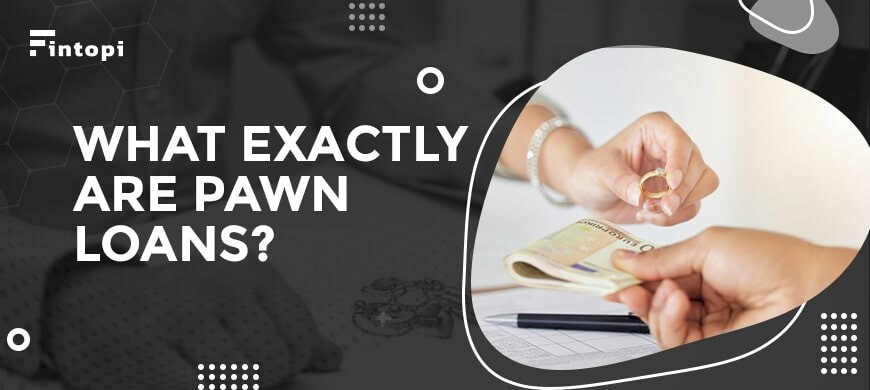Pawn Loans: What You Need To Know About Them?
When a debtor has no other choices for rapid cash, payday creditors, title creditors, and pawnshops all pitch their services to them. Pawnshop loans are typically the least destructive of the three.
Pawnshop loans are more costly than auto title loans or payday loans, but they are the best alternative if you have hardly any other option and have to provide funds without delay.
You can get immediate cash from pawn shops in return for jewelry, electronics, or other valuables you own. Due to the hefty fees and potential loss of your security, this can be a dangerous option for a short-term financial demand.
The information you need to know to make the right financial decisions is provided below.
What Exactly Are Pawn Loans Or Pawn Shop Loans?
A pawn shop loan is a sort of secured loan, meaning it is supported by security. That object you carry inside and exchange with the pawnbroker in this instance is the pawn. You will receive your pawn back if you settle the loan on time. However, if you don’t, the pawnbroker keeps the pawn and sells it to settle the cost of the loan in their store.
Pawnshop loans provide no extra eligibility criteria beyond having anything of worth. Their strength is that you can enter into a pawn shop without an income as well as no credit but still get a loan, unlike other types of loans that depend on examining your credit and income.
How Do Pawn Loans Work?
When you go to a pawnshop to borrow money, you have to put up something as security—like jewelry, a TV, or an instrument the pawnshop will give you a loan depending on the item’s evaluated worth. The pawnshop may hold your security and sell it to recuperate their losses if you don’t return the loan as arranged. The shop frequently lends between 25 and 60 percent of the security’s resell value.
The National Pawnbrokers Association estimates that the typical pawnshop loan is $150. You normally have 30 – 60 days to settle a loan from a pawnshop.
Pawn Loans: Pros and Cons
Pros
- No impact on your credit score – The object you pledged as security will be lost if you are unable to settle the loan, but since the default won’t be recorded to the credit bureaus, your credit score won’t be affected.
- Simple to qualify – You could find it simpler to qualify for a pawn shop loan if you don’t qualify for conventional loans.
- Rapid access to money – With a pawn shop loan, you can get your money much faster than you would with a regular loan because you won’t have to submit a credit check or have your income verified.
Cons
- Collateral loss – You risk losing the object you pledged as security if you may be unable to settle the loan. This is why it could be a good idea to refrain from trying to put down things items you wouldn’t be fine losing if indeed the pawn shop loan was not repaid.
- Costly interest rates – Interest and fees on pawn shop loans can be very high. The rate of interest might range from 12% to 2400%. This may make it difficult for some debtors to settle the loan.
- Low-dollar loan amounts – According to the National Pawnbrokers Association, pawn shop loans typically range from $100 to $150. If you brought a more valuable item, the pawn shop loan could be for a larger sum of money.
What Are the Requirements for Pawn Loans?
Pawnshop loans have fewer conditions than standard loans and credit cards. For instance, you typically don’t have to:
- Completing an application
- Describe your financial situation
- Provide employment verification
Pawn shop loans don’t call for the same procedures that typical personal loans do, such as credit checks, income verification, and financial documents. An expensive piece of security, a legitimate ID, as well as your contact information is required.
You might be able to get money more quickly since you can avoid the procedures needed to get a personal loan. Taking out a loan from a pawn shop won’t affect your credit because they don’t run credit analysis or communicate to credit bureaus. However, a pawn shop loan might not be the best option for you if you’re trying to improve your credit.
Pawn Loans: Alternatives
Sell Your Expensive Items
You might think about selling your items to the pawnshop rather than pawning jewels or other valuables. However, you wouldn’t get as more for that as you would get from a personal buyer because pawnshops buy products with the purpose of reselling them and generating a profit.
Pay with a credit card
You might use a credit card if you must settle for expenses right away. The APR for a buying or cash advance will probably be far lower than the APR for a loan from a pawnshop. Additionally, a track record of timely card settlements will assist raise your credit score.
Apply for a personal loan
Typically, security is not needed for a personal loan. Additionally, it ought to have a significantly lower APR than a loan from a pawn shop. Furthermore, if you settle the personal loan on time, it might help you establish credit. Loans for persons with bad credit or emergency loans are available from some creditors. Compare the conditions and interest rates of any loans you are thinking about taking out.
Take out a payday loan alternative.
Credit unions provide payday loans as an alternative (PALs). PALs are short-term, low-dollar loans, like payday loans, that frequently don’t need strong credit. But you’ll have to provide evidence of your employment and income.
Online peer-to-peer loans
Online peer-to-peer loans are funded by private investors rather than banks or credit unions. You’ll need to complete an application, and depending on your credit, your selections can be limited.



